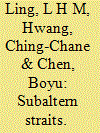|
|
|
Sort Order |
|
|
|
Items / Page
|
|
|
|
|
|
|
| Srl | Item |
| 1 |
ID:
126970


|
|
|
|
|
| Publication |
2013.
|
| Summary/Abstract |
This paper attempts to provide a concrete response and analysis to the decline of Chinese identity in Taiwan. Our focus is on the problem of "Chinese identity" and how this identity is gradually fading, as is evident in long-term public opinion polls conducted by various academic institutions in Taiwan between 1992 and 2012. This paper provides two perspectives to analyze the phenomenon. One is that the occurrence of political events impacts identification, and creates a lasting effect on younger generations. These events seem to have a greater and more continuous impact on the younger and better educated generations. Second, the gradual passing with age of the first generation of waishengren (people of Mainland Chinese origin who came to Taiwan after World War II and their descendents) has contributed somewhat to the decline of Chinese identity, but not enough to be a critical factor. Therefore, this paper provides a preliminary explanation that political events play a key role in influencing the decline of "Chinese identity" in Taiwan.
|
|
|
|
|
|
|
|
|
|
|
|
|
|
|
|
| 2 |
ID:
172802


|
|
|
|
|
| Summary/Abstract |
This study uses a postcolonial approach to focus on the relations between the dominator/colonizer and the subordinated/colonized to reveal how the imperial legacy continues to influence the current relations between Japan and South Korea. The sources of current tensions between Japan and South Korea are threefold: First, the continuity of Japan's worldview inherited from the imperial era still influences Japan's interpretation of historical disputes with its former colonies. Second, decolonization has not been achieved between Japan and South Korea due to the Cold War and pressure from the United States to shelve historical disputes amid the normalizing of relations between Japan and South Korea. Third, as a subaltern state, South Korea was caught between pursuing complete independence and autonomy and collaboration with its past colonizer in the state-building process. This approach sheds new light on the multiplicity of the disputes between the two countries and explains why negative colonial legacies still haunt Japan and its relations with South Korea.
|
|
|
|
|
|
|
|
|
|
|
|
|
|
|
|
| 3 |
ID:
145144


|
|
|
|
|
| Summary/Abstract |
Senkaku/Diaoyu islands dispute has caused tensions among China, Japan, and Taiwan for decades. Although the Taiwanese government keeps a low profile on the dispute, the issue has flared up online discussion among Taiwan’s netizens. Many consider Taiwanese people more pro-Japan than other countries in East Asia, as elder generation living on the island shares nostalgia toward Japan, and as its younger generation charmed by Japanese manga and anime, let alone Taiwan being the top donor to Japan’s 311 earthquake. In this vein, Taiwanese people should accommodate well with Japan. However, Senkaku/Diaoyu islands dispute may tell another story. The act of Japanese government to nationalize Senkaku/Diaoyu islands in 2012 has provoked anger among its neighbor countries. Are Taiwanese people in favor of Japan’s stance on Senkaku/Diaoyu islands dispute due to the attachment for Japan or the other way round? This paper applies text mining technique and sentiment analysis to the digital data of Taiwan’s largest bulletin board system station—PTT—established by college students and extracts postings concerning Senkaku/Diaoyu islands dispute in the past 4 years (2009~2012). By this bottom-up approach, we aim to examine Taiwan’s netizens’ emotion toward the two hegemonies—i.e., Japan and China—and to see whether the strong attachment to Japan has any impact on netizens’ opinions on the dispute.
|
|
|
|
|
|
|
|
|
|
|
|
|
|
|
|
| 4 |
ID:
093856


|
|
|
|
|
| Publication |
2010.
|
| Summary/Abstract |
Mainstream approaches perpetuate the Taiwan-China 'crisis'. They do so by following Cold-War concepts and prescriptions, despite the rise of new realities and new visions for cross-strait relations. We draw on Hirschman's identification of 'loyalty' and 'voice' to describe the mainstream discourse on cross-strait relations in Taiwan, mostly directed by the United States. But a third option is now emerging. It offers the possibility of a paradigmatic breakthrough or 'exit' based on articulations of a postcolonial subjectivity for Taiwan and its relations with China.
|
|
|
|
|
|
|
|
|
|
|
|
|
|
|
|
|
|
|
|
|